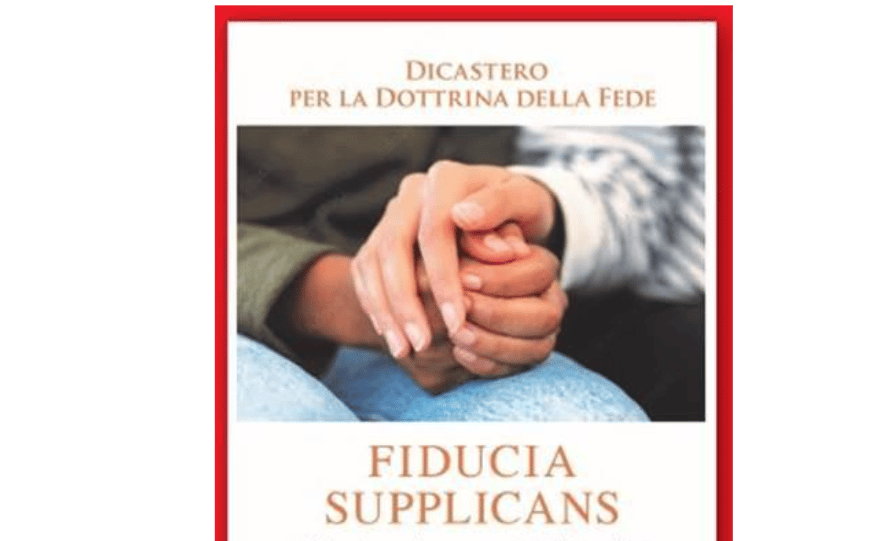YAOUNDÉ, Cameroon – A leading South African Jesuit has dismissed the furor over a recent Vatican document authorizing non-liturgical blessings of people involved in same-sex unions as a tempest in a teapot, arguing that it’s a distraction from far more important issues.
Father Russell Pollitt, Director of the Jesuit Institute of South Africa, cited the abuse of women and children, abuse of power in the church, financial mismanagement in the Church as well as the several wars blighting the world today as examples of matters neglected in the wake of the storm surrounding Fiducia Supplicans.
The document sparked worldwide controversy, with the Symposium of Episcopal Conferences of Africa and Madagascar voicing compact opposition to the possibility of blessing same sex unions. Pollitt, however, argued that not all Catholic leaders in Africa necessarily see things the same way.
Following are excerpts of Crux’s conversation with Pollitt.
Crux: Most African clerics have argued that giving gays a blessing actually means agreeing with or endorsing what they are doing. The president of Cameroon’s bishops’ conference, for instance has argued that it would be tantamount to ‘blessing sin.” How would you tell him that Fiducia Supplicans isn’t advocating for the blessing of sins?
Pollitt: I would prefer to say ‘some’ African clerics. It is clear that there have been some strong voices that have been magnified but there are also many who, mostly silent, have not necessarily voiced an opinion or hold an opposite opinion which they will talk about in private but not in the public domain. I think that it is very important to pay attention to what the actual text of the document says, and not read reports that have been offered through the lens of journalists.
Bishop Sithembele Sipuka, president of the Southern African Conference of Catholic Bishops, captures it succinctly: ‘People who have deviated, or who are deviating, from the will of God are not excluded from the mercy of God.” Cardinal [Stephen] Brislin of Cape Town, speaking at a press conference, also makes things clear: ‘What this document is saying is that if such people come for a blessing, that blessing should not be denied to them because a blessing is not a reward for perfection. We know that Christ came for sinners.’
This is a pastoral document rooted in the greatest commandment to love others (Matthew 22:36-40). We should also pay heed to Jesus’ words about judgement: ‘Do not judge, or you will be judged. For the same way you judge others you will be judged and with the measure you use’ (Matthew 7:1-3).
As for blessing sin: When asked for a blessing, nobody asks the person requesting one if they are in mortal sin – they offer the blessing. If a prison chaplain is asked by a prisoner who has committed murder or raped someone for a blessing, does the chaplain refuse because they might be in ‘mortal sin’?
We cannot make assumptions about people. Do we ask heterosexuals if they are cohabitating and physically involved before giving a blessing? Such people would be in mortal sin. Or, as the pope has said, when a businessman who is exploiting workers asks for a blessing do we refuse on the basis that exploiting another is sinful?
Refusing some people (gay people) and giving a blessing to others who may well be living in sin is a hypocritical position. Refusing gay people because somehow they are deemed ‘more sinful’ than, say, an adulterer or murderer, is not just and suggests some deep-seated prejudice or fear that we must face.
You make reference to man being made in the image and likeness of God and therefore should not be denied the blessing of his maker. Does that not contradict the Biblical account of Sodom and Gomorrah where God destroyed the entire people because of Homosexual behavior?
There are many ways of looking at biblical texts – you offer one interpretation. Please read the following for another way of understanding the text: https://outreach.faith/2022/12/the-story-of-sodom-and-gomorrah-asks-us-to-consider-our-own-inhospitality/
A word of caution: We must be careful that when we apply texts, we apply them equally. Jesus says if your eye causes you to sin, tear it out. When someone looks at another lustfully do we insist on this for men who objectify women, for example? Many things we do and allow to happen contradict the Scriptures in places, why are some of and others not?
You framed your argument in terms of a question, but do you believe that the debate around the Vatican Document on same sex blessings is a ‘a tempest in a teacup’ and that it somehow distracts from the real issues confronting the world?
Yes, I do believe that it is distracting from more important issues: Massive credibility issues such the abuse of power in the Church, abuse of children and women, denial when it comes to abuse on all fronts, a culture of secrecy, poor theological formation and a catechesis of clergy, the decline of belief in the world and the struggle in Africa to reconcile traditional cultures and the Church’s teachings, the fragility of celibacy amongst priests in the African church, financial mismanagement of both Church and donor funds, ongoing wars, growing gap between the rich and poor, the disastrous global leadership crisis…
These seem to be issues that are, often, a thin line between life and death for ordinary people. Why so much energy on pastoral guidelines when these issues are, mostly, left poorly attended to?













